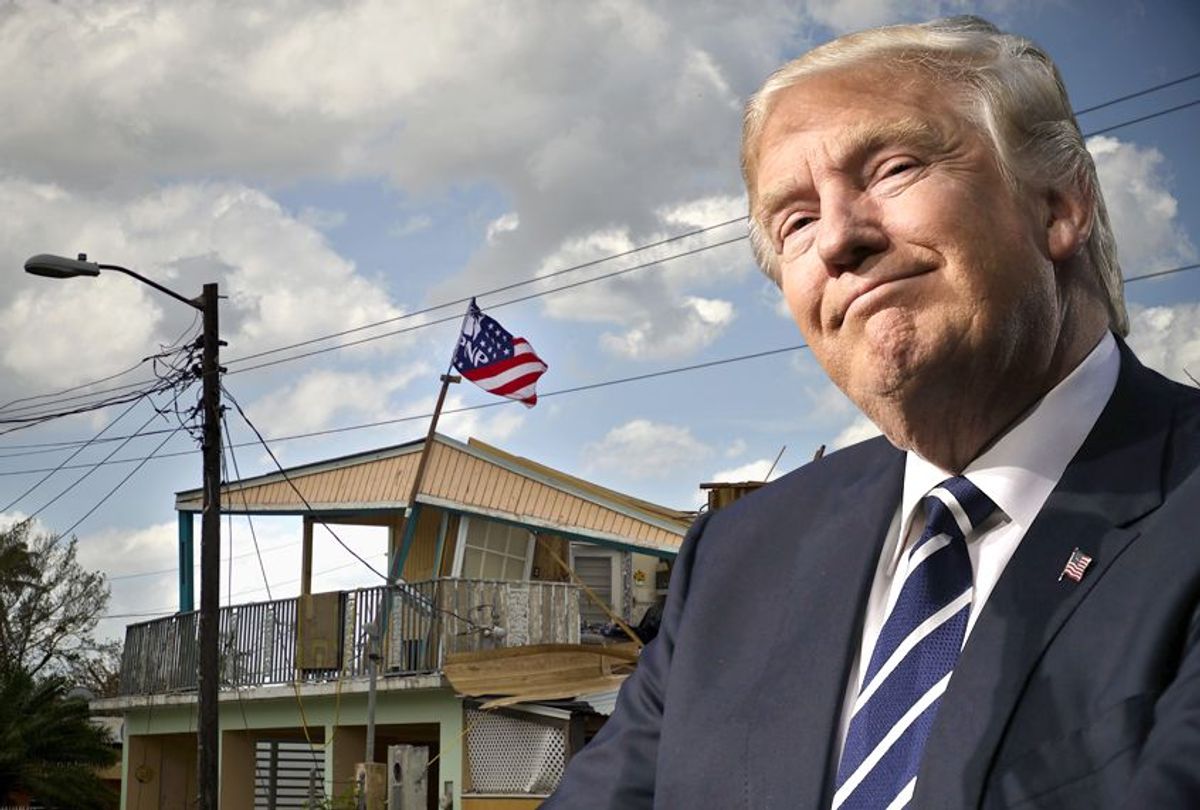A recent study has concluded that at least 4,645 people died in Puerto Rico due to Hurricane Maria — a far cry from the death toll projected by President Donald Trump in October.
According to a study conducted by Harvard University andpublished in the New England Journal of Medicine, a loss of basic utility services on the U.S. commonwealth left the elderly and chronically ill without care in the chaos of last September's hurricane and its aftermath.
Much of Puerto Rico's infrastructure, including much of the electrical grid, continues to remain down despite the passage of more than half a year, while potable water and essential medical services are still unavailable for many island residents.
The news about the death toll in Puerto Rico is in stark contrast to the rosier picture of the island's situation that Trump has tried to depict since the hurricane struck. Speaking with Puerto Rican officials in October, Trump told them that they should proud that not as many people had died on the island as were suspected of dying due to Hurricane Katrina, according to CNN.
"Every death is a horror, but if you look at a real catastrophe like Katrina and you look at the tremendous — hundreds and hundreds of people that died — and you look at what happened here with, really, a storm that was just totally overpowering ... no one has ever seen anything like this," Trump said at the time.
After asking Governor Rosselló added that only 16 people were known to have died, Trump ran with it.
"16 people certified! Sixteen people versus in the thousands," Trump boasted. "You can be very proud of all of your people and all of our people working together. Sixteen versus literally thousands of people. You can be very proud. Everybody watching can really be very proud of what's taken place in Puerto Rico."
Since 1,833 are believed to have died in 2005 as a result of Hurricane Katrina, this means that Maria ultimately took more than twice as many lives as that storm.
Obviously, it stands to reason that, in a commonwealth with more than 3 million residents, more than 16 people would have died after a storm as wide-ranging and devastating as Hurricane Maria. Yet by early December, the official estimate had only been increased to 64, even though media reports and analyses had placed the number at over 1,000. Eventually, Governor Ricardo Rosselló decided it was necessary to receive outside help and asked George Washington University experts to look into the government's death certification process.
There are a number of different kinds of deaths that can occur as a result of a natural storm, which makes calculating them difficult even in situations where the government is doing its job competently. These can range from deaths caused by lack of access to medical services which otherwise would have saved lives to being hurt by flying debris or dying from exposure to the elements during or after the storm itself.
At the same time, there were factors unique to Puerto Rico that has made it especially difficult to accurately calculate the death total. As The Washington Post. :
The Harvard researchers reported that there are several reasons the death toll in Puerto Rico has been drastically underestimated. Every disaster-related death, they said, must be confirmed by the government’s Forensic Sciences Institute, which requires that bodies go to San Juan or that a medical examiner travel to the local municipality. And it can be difficult to track indirect deaths from a worsening of chronic conditions due to the storm.
The researchers said that the government of Puerto Rico stopped sharing mortality data with the public in December 2017.
“As the United States prepares for its next hurricane season, it will be critical to review how disaster-related deaths will be counted, in order to mobilize an appropriate response operation and account for the fate of those affected,” the authors wrote.
Trump has been harshly criticized for his lackluster response to the humanitarian crisis in Puerto Rico. As of March he had spent more public resources on helping Texas after Hurricane Harvey than he did on helping Puerto Rico after Hurricane Maria, including moving more quickly to provide assistance to residents of the Lone Star State than those in the Caribbean commonwealth. Trump also delayed in waiving the Jones Act, a law that had impeded the delivery of vital resources to the Puerto Rican people, and allowed that waiver to expire only weeks after putting it into place.
Trump has also been criticized for making racist comments in the aftermath of the hurricane. For instance, after the mayor of San Juan made a public plea for the president to devote more resources to helping Puerto Rico, Trump posted a series of tweets implying that the Puerto Rican people are lazy.
As talk show host John Oliver explained at the time, "You have got to hand it to Trump: anybody can say horribly racist things about Hispanic people on a golden escalator, but it takes real balls to do it while their fellow citizens are dying. Trump is basically saying: ‘When hurricanes are hitting our people, they’re not hitting our best, they’re killing poors, they’re killing lazies and some, I assume, have said nice things about me.’"
Trump also infamously pronounced the name "Puerto Rico" in a distinctly racist fashion in the month after Hurricane Maria devastated the island.
"Puerto Ricans feel American, but also feel Puerto Rican. They have a lot of loyalty to their culture, their island, their language. That as seen as, 'Therefore, they're not fully Americans,'" Professor Jose Moya of Barnard College told Salon in October.

Shares